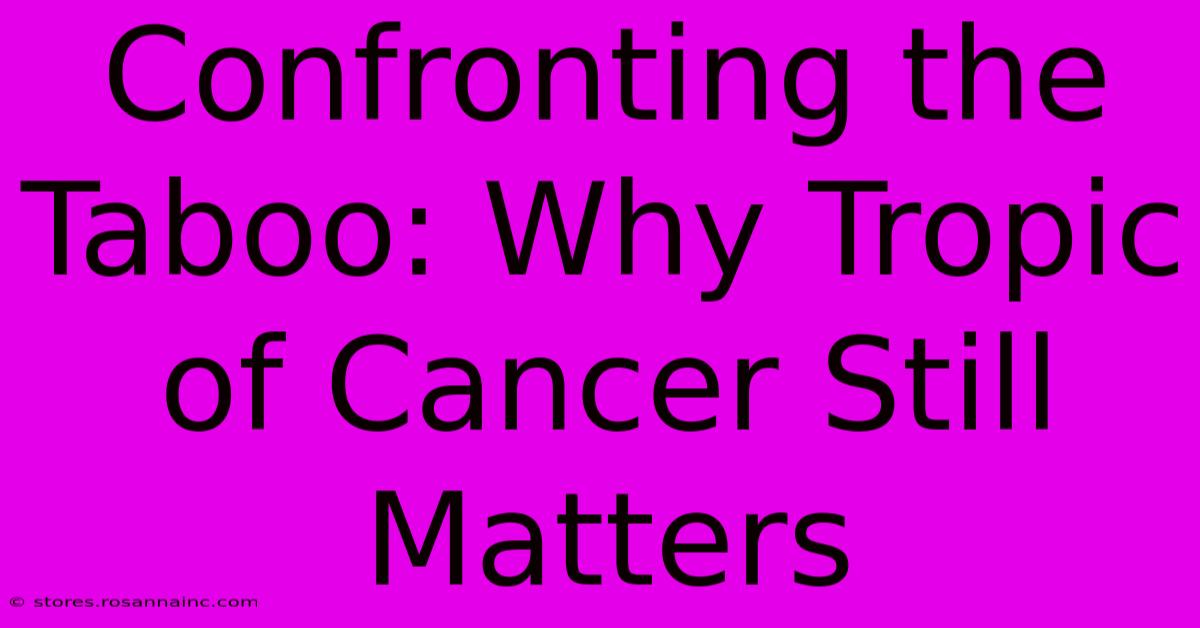Confronting The Taboo: Why Tropic Of Cancer Still Matters

Table of Contents
Confronting the Taboo: Why Tropic of Cancer Still Matters
Henry Miller's Tropic of Cancer, first published in 1934, remains a controversial masterpiece. Banned in the United States for decades due to its explicit sexual content and unflinching portrayal of bohemian life in 1930s Paris, the novel continues to spark debate and fascinate readers. But why, in the age of readily available explicit material, does Tropic of Cancer still matter? Its enduring relevance lies not solely in its graphic depictions, but in its potent exploration of themes that resonate deeply even today.
Beyond the Taboo: Exploring the Novel's Enduring Themes
While the book's explicit sexuality undoubtedly contributed to its notoriety, it's crucial to understand that this is merely a vehicle for Miller's deeper explorations. The raw, unfiltered depiction of sex serves as a commentary on societal hypocrisy and the repression of human desire. This is not simply pornography; it's a critique of the constraints placed on individual expression.
1. The Search for Authenticity in a Modern World
Tropic of Cancer is a visceral account of Miller's desperate search for authenticity in a world increasingly defined by superficiality and conformity. He rails against the stifling norms of bourgeois society, finding solace and liberation only in the raw, often chaotic, reality of his Parisian existence. This yearning for genuine connection and self-discovery remains a powerfully relevant theme in our own age of social media curated identities and performative authenticity.
2. Poverty, Alienation, and the Human Condition
Miller doesn't shy away from portraying the harsh realities of poverty and alienation in Paris. His characters grapple with financial insecurity, loneliness, and the constant threat of societal marginalization. This honest portrayal of the human condition, stripped bare of romantic idealism, forces readers to confront uncomfortable truths about the struggles faced by many. The enduring power of Tropic of Cancer lies in its unflinching depiction of the human experience in all its messy, unfiltered glory.
3. Artistic Freedom and Censorship
The book's long-standing ban in the US highlights the ongoing battle between artistic freedom and censorship. The very act of banning the book ironically amplified its impact, transforming it into a symbol of defiance and a testament to the power of unfettered expression. The debates surrounding its publication remain relevant in today's discussions about freedom of speech and the limitations placed on artistic creativity.
4. A Literary Style That Defies Convention
Miller's writing style is unique and powerful. He employs a stream-of-consciousness narrative, blending realism with surrealism and often employing jarring and unconventional imagery. This bold and experimental approach to writing broke with traditional literary norms and continues to influence contemporary authors. The sheer force of his prose, despite its occasional crudeness, remains captivating.
Why Tropic of Cancer Still Matters Today
In conclusion, Tropic of Cancer continues to resonate with readers not simply because of its explicit content but because it grapples with timeless and universal themes. Its exploration of authenticity, alienation, artistic freedom, and the complexities of the human condition remains profoundly relevant in a world grappling with similar issues today. The book's enduring power lies in its ability to challenge conventions, provoke thought, and ultimately, to force us to confront the uncomfortable truths about ourselves and the society we inhabit. It is a book that demands to be read, discussed, and debated – a testament to its lasting significance.
Keywords: Tropic of Cancer, Henry Miller, banned books, sexual content, censorship, artistic freedom, authenticity, alienation, poverty, bohemian life, Paris, stream of consciousness, literary style, human condition, controversial literature, modern literature, classic literature.

Thank you for visiting our website wich cover about Confronting The Taboo: Why Tropic Of Cancer Still Matters. We hope the information provided has been useful to you. Feel free to contact us if you have any questions or need further assistance. See you next time and dont miss to bookmark.
Featured Posts
-
Ecosse Irlande Reponse De Prendergast
Feb 10, 2025
-
Speaking The Right Language Your Key To Singaporean Success
Feb 10, 2025
-
J Geils Bands Peter Wolf Where Is He Now
Feb 10, 2025
-
Conquer Your Fear Kingda Ka At Six Flags Great Adventure Awaits
Feb 10, 2025
-
England Crushed Rohit Sharmas 119
Feb 10, 2025
